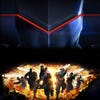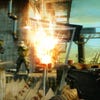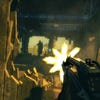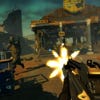Bodycount: “We wanted to do something different”
Codemasters’ shooter prepares to emerge from cover.
Bodycount's been no stranger to adversity: Codemasters' spiritual sequel to Black has seen the departure of some important team members, and been the subject of plenty of rumour regarding missed milestones and brutal crunch periods. With the project finally headed to a late summer release, we caught up with game director Andrew Wilson to get his perspective on a troubled development – and to see what's driving this ambitious shooter.
The problem is that a lot of developers will get through development without having a figurehead like that, because it can become a personality-driven thing. When you get someone like Stuart, who's obviously very outgoing, very passionate, and very capable when it comes to articulating the game, of course you put them up as the figurehead.
It sort of gives a false impression of how important people are, because it's a dev team. By the time Bodycount's done, well over 100 people will have worked on it. You could take a variety of people across the team and say that if they left it would actually be more damaging than some of the senior people who have gone. Particularly on the code side, like the lead gameplay programmer - if he turned around and left tomorrow, I'd be a lot more upset, because he's fundamental in terms of actually getting the game built.
So when you put a figurehead up like that, you can give a false impression of the importance of individual people. Really, it's a team sport.
It unsettles people. Of course it does. There will be some people on the team who don't have massive day-to-day contact with the people leading the team because it's such a big group, so it can be unsettling. But then you get through the next couple of weeks and you see that nothing really has changed and everybody else is just carrying on. Then you go and do another public demo and that goes well. It's not easy having people leave like that, but it happens. It happens a lot.
No, not at all. We didn't have a specific release date for quite a while, and the reason was that for new IP, it's very difficult to map something out and know exactly when it will be done. It's much easier with a straight sequel, which is a known quantity. So actually, the release date has shifted. Not by huge amounts. We locked it a few months ago, just after Christmas. We are in a crunch period at the moment: we've just come through alpha and we're getting into the bug-fixing stage. I've never worked on a project where that's not the case. I've worked on worse projects than this in terms of crunch, too.
The money's not run out, either. Let me put it like this, if we were told to, we could take what we've built, fix the bugs, and put it in a box very quickly. And we're not doing that.
We're happy with the feature set that we've built, so we're not building any more features. The last few features came in in the last few weeks. We're now balancing the game. We're getting a lot of people in, we're doing a lot of testing with people from the target audience. We're doing a lot of fine-tuning, and we're trying to week-by-week just lift the whole thing. This is the time that, when you cut it from a project, you cut ten percent of the quality. You need to give it that final month at the end where the screws get tightened up and you tweak and balance it.
It was a risky choice to make. When you create something entirely new, everything that you do slightly differently is a risk. We decided to push this in a different direction very early on. Partly it was because there are certain things we don't like about other shooters, and partly it was because we wanted to do something different. It's very hard to take a group of people and gee them up to make something that is just like something else. It's far better if you can say, "This is Bodycount. This is what we're building." All the AI and open level design really fed into that and supported it.
I think it's less risky to push in a new direction with a new FPS at the moment. If you look at something like COD, and you go up against them saying you can out-gun the big boys, you're going to lose. Not only have they spent an obscene amount of money on it, but they've spent years and years iterating that exact concept, through a number of sequels, to get it, for what it is, pretty much perfect. You're not going to compete with it, you're only ever going to be compared to it - and those comparisons are only ever going to be unfavourable. So taking a risk and pushing in a new direction, at least you can say that it's different and you don't get a lot of comparisons to anything else.




























